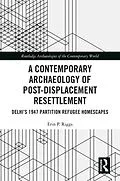This book explores the archaeology of the 1947 Partition, the largest mass migration in human history, and the resulting resettlement of half a million refugees in Delhi, India's capital city.
Interweaving material analysis with oral history collection and archival sources, this book considers how Delhi's Partition refugees have interacted with the city's built landscapes through time. It demonstrates how government-built refugee colonies, influenced by both socialist and capitalist design philosophies, provided an effective and adaptable setting for resettlement. In contrast, it illustrates how Delhi's pre-Partition landscapes-including 'evacuee properties' vacated by out-migrating Muslims and sections of the planned, colonial capital-have proven more problematic venues for rehousing. In these contexts, refugee families navigated life within homes shaped by past occupants and colonial-era wealth disparities. The book highlights that despite such difficulties and the unprecedented scale of Partition's impact on Delhi, refugees have obtained an impressive degree of material success and social acceptance in the city. This example challenges assumptions about the aid-dependency of refugee communities, the potential effectiveness of public housing, and the mutability of national belonging.
This interdisciplinary case study will be of interest to scholars in varied fields of study, including archaeology, architectural history, cultural anthropology, human geography, and South Asian studies.
Autorentext
Erin P. Riggs is an assistant professor of Anthropology at the University of Illinois at Urbana-Champaign. She is a contemporary and historical archaeologist, and her research interests include welfare state initiatives, material culture, built landscapes, national belonging, and displacement in the recent past.
